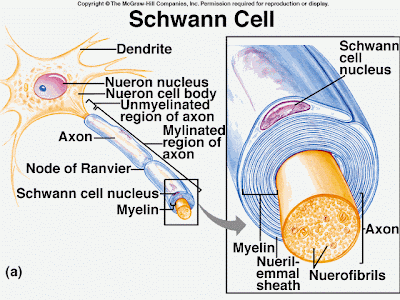Now, here's the interesting thing. Studies done on (supposedly) Einstein's brain, show that he didn't really have any greater number of neurons, but actually had more neuroglia, particularly astrocytes, which were concentrated in the area of the brain involved in imagery and complex thinking (NPR news article on the subject, June 2010).
 |
| Picture source |
My thought is that we don't know which came first - the astrocytes or his genius. Perhaps using your brain well leads to making more astrocytes in order to support how much you're using certain areas of the brain, rather than the astrocytes coming first and giving natural intellectual ability.
So, on that note, we'll take a look at these cells. :) Here is a good way to categorize them, from interactive-biology.com. I'll expound on these more.
 |
| Source (interactive-biology.com) |
And for the visual folks out there, here are a couple of diagrams.
 |
| Source |
 |
| Source |
Neuroglia in the Central Nervous System
 |
| Source |
- Support neurons in the CNS by myelinating. Have multiple "arms" with which they myelinate several axons.
- Myelination insulates axons of neurons which allows their conduction to go much more quickly. (For some info on how this works, go to this post on action potentials and scroll to the bottom for "saltatory conduction".)
- Similar function in PNS is performed by Schwann cells
Astrocytes (a type of macroglia)
- Named for their star appearance (astro = star, cyte=cell)
- Maintain neuronal environment
- Part of the blood-brain barrier
- Control what substances are transported from blood to neural tissue (Source article)
- Have their own signalling system and can regulate messages of neurons
- Topic of much research - some are calling these "the other brain" (Source article)

Source
My note on Astrocytes: wow, these look like such an exciting topic right now! These are the cells that Einstein's brain had more of, and it looks like we are just discovering how integral they really are to the function of neurons!
Microglia
- Immune cells of the CNS - these bad boys take care of infection by foreign pathogens, and keep any abnormal neurons in check, gobbling up anything that shouldn't be there. In short, they are the macrophages of the brain and spinal cord.
- Named for being small (micro), which allows them to get around to whatever small spaces necessary for fighting infection.
 |
| Source |
Ependymal glia
 |
| Source on brainyinfo.com |
- Ciliated epithelial tissue
- Line the ventricles and choroid plexus of the brain
- Make Cerebrospinal fluid (CSF)
- (Very good source article on brainyinfo)
Neuroglia of the Peripheral Nervous System
Schwann Cells/ Neurolemmocytes
 |
| Source |
- Schwann cells have the same function in the PNS that Oligodendrocytes have in the CNS, namely myelination.
- The cell wraps itself around the axon of a neuron, insulating it, as seen below. Pretty cool, eh?
| Source on brainyinfo.com |
Satellite Cells
- Cushion neurons
- Help control the environment of neurons and maintain synaptic integrity by insulating areas where there shouldn't be additional synapses on the neuron.






























